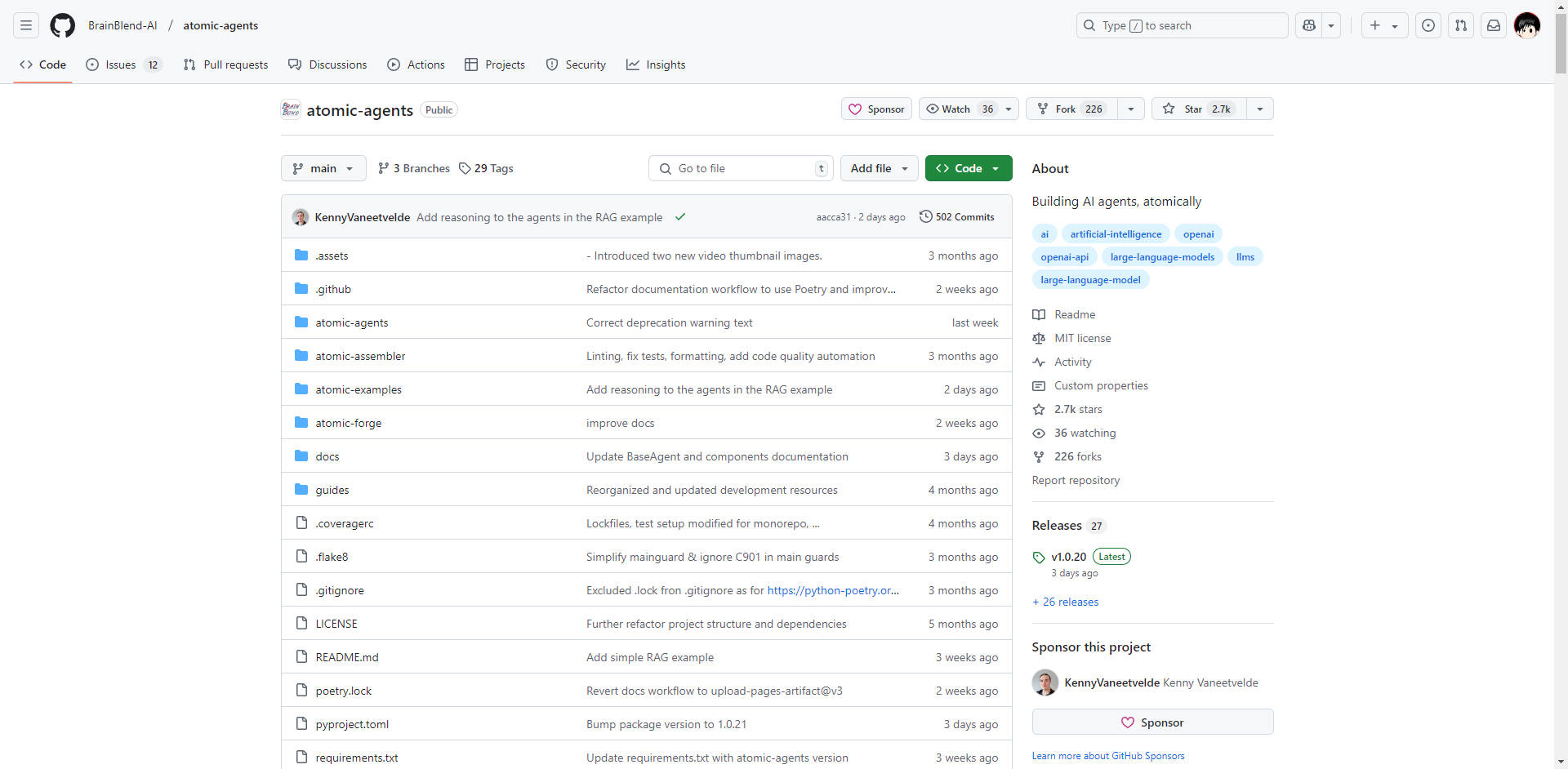
What is Atomic Agents?
Building robust, real-world AI applications often requires a level of control and predictability that many existing agent frameworks struggle to provide. Atomic Agents is a Python framework designed to solve this problem. It allows you to construct agentic AI pipelines and applications using a highly modular, atomic approach, ensuring consistent behavior, easy debugging, and seamless integration with your existing workflows.
Key Features:
⚛️ Embrace Atomicity: Construct applications by combining small, independent, and reusable components. This modular design simplifies development, testing, and maintenance.
📝 Define Clear Schemas: Leverage Pydantic for rigorous input and output schema validation. Ensure data consistency and predictable agent behavior, eliminating unexpected results.
🐍 Pure Python Control: Write all logic and control flows using native Python. Apply familiar software development best practices, version control, and testing methodologies directly to your AI pipelines.
⚙️ Customize System Prompts: Craft precise instructions that guide agent behavior. Define background information, step-by-step processes, and output specifications to achieve desired results.
🧠 Incorporate Memory: Maintain conversation history or other relevant data using the built-in
AgentMemorycomponent. Enable context-aware interactions and persistent state.🧩 Inject Dynamic Context: Utilize Context Providers to seamlessly insert real-time information (like search results or API responses) directly into the agent's system prompt, enhancing its responses with up-to-date data.
🔄 Effortless Chaining: Easily connect agents and tools by aligning their input and output schemas. This enables the creation of complex workflows with swappable components.
🔌 Broad Provider Compatibility: Powered by the Instructor package, Atomic Agents is compatible with a wide range of LLM providers, including OpenAI, Ollama, Groq, Mistral, Cohere, Anthropic, Gemini, and more.
Use Cases:
Dynamic Research Agent: Imagine building a research agent that needs to pull information from multiple sources. You can create a "Query Generation Agent" (using a defined output schema) that feeds its results directly into various "Search Tool Agents" (each with a compatible input schema). If a search provider becomes unavailable, simply swap out the corresponding agent without affecting the rest of the pipeline.
Multi-Step Data Processing: Suppose you need to extract structured data from unstructured text, then perform calculations on that data. You could chain an "Information Extraction Agent" (outputting a specific schema) to a "Calculation Agent" (expecting that schema as input), ensuring a reliable and predictable data flow.
Context-Aware Customer Support: Create a customer support chatbot that can access real-time information. Use a Context Provider to fetch relevant customer data (e.g., order history, account details) and inject it into the system prompt. The agent can then provide personalized and accurate responses based on the provided context.
Conclusion:
Atomic Agents provides the tools and structure to build production-ready agentic AI applications with confidence. Its emphasis on modularity, predictability, and Python-centric development makes it a powerful and flexible choice for developers seeking greater control and maintainability in their AI projects. Easily extend the functionality with the Atomic Forge, containing tools such as a Calculator, SearxNG Search, and a YouTube Transcript Scraper.

More information on Atomic Agents
Atomic Agents Alternatives
Load more Alternatives-

OpenAI Agents SDK: Python for production AI apps. Build agents, tools, guardrails, tracing.
-

Agent Squad: Open-source framework to orchestrate AI agent teams for complex conversations. Python & TS support, flexible context & routing.
-

SuperAgentX, an open - source AI framework, enables building autonomous AI agents for AGI. Features include goal - oriented multi - agents, easy deployment, and flexible LLM config. Ideal for e - commerce, data analysis, and research. Explore AGI possibilities now!
-

-

Build, deploy & manage advanced AI agents with AgentForge. Open-source framework for sophisticated, context-aware multi-agent workflows.
